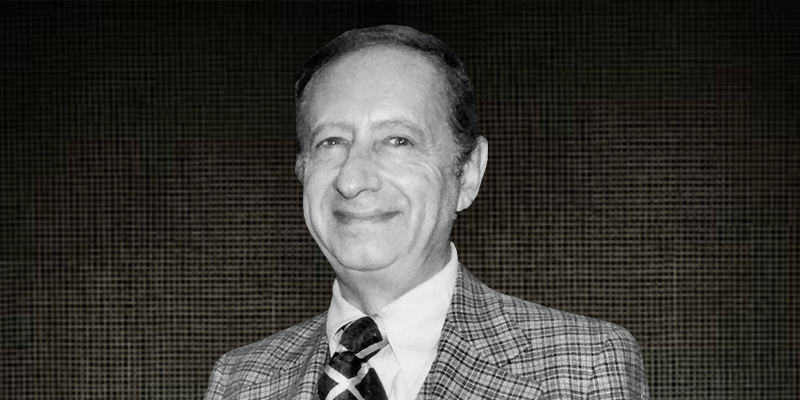“I have the heart of a small boy. I keep it in a jar, on my desk.”
Robert Bloch wrote those words a couple of decades before I was born and long before he became best known as the author of the 1959 novel “Psycho,” the basis for the 1960 Alfred Hitchcock suspense and horror film.
Those words were pretty much the first thing I knew about Bloch. He was introduced to many of us youngsters in the pages of Famous Monsters of Filmland magazine, where that joke was recounted by FM’s editor, Forrest J (no initial) Ackerman, a contemporary of Bloch and his longtime friend.
Ackerman noted, sometime in the late 1960s or early 1970s, that Bloch was so well known as the author of the original “Psycho” novel that he was often introduced as “Robertpsychobloch,” all one long, run-on word.
Bloch liked puns almost as much as Ackerman did, judging from “Once Around the Bloch: An Unauthorized Autobiography,” his 1993 review of his life which manages to cram hundreds of puns into its text: hell, there’s two in the title alone.
So many puns, in fact, that they make Bloch’s autobiography tough reading, at least in the first 200 pages. More on the book in a bit.
I often think of “Psycho,” both book and film, as a horror tale, but it’s filled to the brim with crime, including the bank theft that kicks off the story as well as murder and attempted murder. It’s fitting that Bloch was the guest of honor at the first Bouchercon, the world convention devoted to crime and mystery writing, in 1970. Bloch was a well-known figure in literature, especially genre literature, for decades before his death in September 1994.
In some ways, Bloch is among the fathers (and mothers) of all of us who write crime fiction today.
Bloch felt the effects of changing tastes
It was not Famous Monsters but another classic horror film genre magazine, Castle of Frankenstein, that in a two-part 1971 feature on Bloch also used the “heart of a boy” gag – but not as succinctly and not as pithily as did Famous Monsters. But it’s fascinating to read, in successive issues, an interview with Bloch, just a little more than a decade after “Psycho.”
CoF recounts what Bloch later told in fairly elaborate detail in his 1993 autobiography: that among the career-defining moments of his life was his friendship with horror writer H.P. Lovecraft, who encouraged him to write tales of the macabre that were ultimately published in Weird Tales magazine, the definitive pulp purveyor of the odd and fantastic.
Besides becoming a friend, Lovecraft was a formative influence on Bloch. And the stories told by Lovecraft and others in issues of Weird Tales helped shape Bloch’s writing style and genre leanings in the late 1920s and early 1930s. Bloch sold his first story to Weird Tales in 1934, just weeks after he graduated from high school. He would write hundreds more, in almost every genre, as well as 30 novels and dozens of film and TV screenplays. Of the latter, Bloch wrote three for the original “Star Trek” series alone.
The Bloch interview, beginning in issue 16 and continuing into 17 of CoF, opens with Bloch’s answers to questions about “Frankenstein” actor and Bloch friend Boris Karloff, who had died in 1969, two years before the issue came out. But after that it settles into Bloch’s work on “Psycho” and some of the films he wrote in the 1960s and early 1970s.
Bloch, whose novel was the basis of one of the most classic of classic films, told the interviewer that he felt the same insecurities and frustrations of any writer. By the end of the 1960s, he confessed he had his struggles.
“Markets have changed. I will say quite candidly that in the past year, I’ve written five short stories – three of them haven’t been placed because the markets have changed for that sort of material. I would like to write a great deal more fiction, but there is the problem of market accountability. So I write to specification.” Bloch spoke about how things had changed since he wrote for Weird Tales and other magazines in the 1930s. “I feel the times have changed. And they change for every writer. There is no writer living who will end up 30 years later with the same market conditions and the same audience and the same media.”
Bloch was critical of himself: “I’ve always suffered from a shortage of talent. I’m very limited.” He cited his “inadequate” education and the challenge of keeping up with trends.
“Empathy is the only strength I have. The ability to put myself inside the characters and understand their motivations.”
Bloch was equally self-deprecating in his autobiography.
Bloch wrote the book on Bloch
The autobiography recounts Bloch’s growing up in the Midwest, early successes as a short story writer and friendship with Lovecraft. There’s a recounting of his work in advertising and a too-lengthy account of his work for a local political candidate. I’m hard-pressed to imagine why Bloch or any editor thought it was good to spend so many of the first 200 pages on some of these minutiae. How did he remember so many details of what he did and where – and why render them so dull and punny?
The book really, finally takes off as Bloch recounts what might be his second best-known story. “Yours Truly, Jack the Ripper.” Published in Weird Tales in July 1943, the story has been adapted into various mediums – and ripped off even more. If you’ve seen a TV drama or movie with the late 1800s killer who prowled London has been updated to modern day, particularly in the United States, you’ve seen someone ripping off Bloch. The author returned to his own Ripper character several times, including for “Wolf in the Fold,” one of his “Star Trek” episodes.
Two hundred pages in, Bloch’s autobiography gets rolling, with discourse about writers, readers, fandom and, eventually, “Psycho.” Hitchcock’s production company famously made an anonymous purchase of “Psycho” for filming. (Hitchcock – in the book-length conversation “Hitchcock/Truffaut” – calls Bloch’s “Psycho” a “serious story told with tongue in cheek.”)
Bloch was one of those authors – referred to as all one run-together name that included his most famous work – who was part of a well-known, even brand-name literary class. James Patterson and Lee Child are more modern-day examples, and Stephen King might be the ultimate brand-name writer working today.
Gentle, generous – and a cheater?
With “Psycho” making him a marketable name, Bloch shifted his focus to screenplays for movies and dozens of TV episodes for series like “Thriller” – hosted by Karloff – and “Alfred Hitchcock Presents.” He maintained a mix of fiction and screenplay output and even wrote two novels that served as sequels to his “Psycho.”
And his likable persona loomed large.
Harlan Ellison, the writer of fantastic stories who had “Star Trek” and several short story collections in common with Bloch, cited the author in a column reprinted in Ellison’s 1985 collection “An Edge in My Voice.” He said Bloch was an example of why readers should never confuse writers with the characters and stories they write.
“Just because Bob Bloch – one of the gentlest men who ever lived – wrote “Psycho” is no touchstone to a perception that he is secretly a deranged mass murderer,” Ellison wrote. Ellison cites Bloch in a column reprinted in Ellison’s 1988 “Harlan Ellison’s Watching,” also noting that Bloch was capable of moving freely from novels to short stories to movies to TV scripts. “Because for every William Goldman, William Faulkner or Robert Bloch, who can swing both ways, book to film and back, there are thousands of narrative writers who have fruitlessly thumped their noggins against the enigma of how to write cinematically.”
In the “Hitchcock/Truffaut” book, the famed French director had nits to pick with Bloch’s original novel.
“I’ve read the novel from which ‘Psycho’ was taken and one of the things that bothered me is that it cheats,” Francois Truffaut says. Truffaut cites what he believes was Bloch’s misdirection in the book, staging a scene between Norman Bates and his mother by noting, “Norman sat down beside his mother and they began a conversation.” He maintains that’s “misdirecting,” and says Hitchcock’s movie doesn’t do that.
Bloch’s credits as a screenwriter are all over Michael Weldon’s indispensable 1983 reference book, “The Psychotronic Encyclopedia of Film.” Bloch’s original screenplays are cited throughout, including the 1972 anthology film “Asylum,” written for the screen by Bloch based on his own stories, to the 1973 thriller “The Cat Creature.” And of course, “Psycho” is represented.
In a video released after Bloch’s death, Ellison recounts how Bloch loaned him $200 – a princely sum in 1962, Ellison notes – when the younger author arrived in Hollywood. They two had known each other through writing and fandom circles since Ellison was a teenager. Ellison said he couldn’t pay Bloch back for several years and Bloch not only never mentioned the debt but seemed caught off guard when Ellison paid it back.
Bloch was “a generous individual,” Ackerman said after Bloch’s death. “He gave away thousands and thousands and thousands of words free to fans starting their mimeographed magazines.”
Maybe Bloch’s heart wasn’t really the one in a jar on his desk.

















